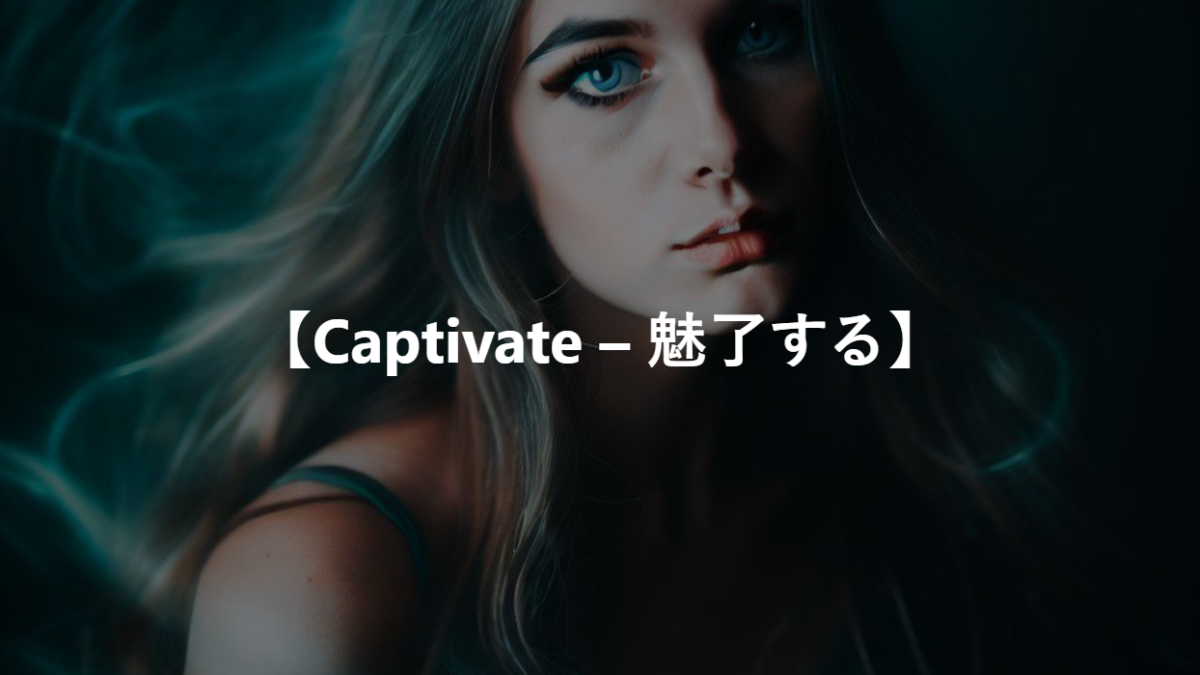語源・類義語・反対語・例文
【Captivate – 魅了する】という単語の語源とか由来を知っていますか?
「Captivate」という単語は、ラテン語の「capere」という動詞から由来しています。「capere」は「つかむ」「捕らえる」という意味があります。時間が経つにつれ、「captivate」は「capere」から派生した「captivus」という単語に由来するようになり、「捕虜にする」や「捕える」といった意味を持つようになりました。
しかし、英語において「captivate」はもっと比喩的な意味で使われるようになり、「人の注意や興味を強く引きつける」や「魅了する」という意味で用いられるようになりました。この変化は、物理的な拘束から精神的、感情的な影響へと意味が広がった結果です。
要するに、「captivate」の語源はラテン語の「捕らえる」という動詞にさかのぼりますが、現代英語では「誰かを魅了し、心を奪う」という意味で広く使われています。
The word “captivate” originates from the Latin verb “capere,” which means “to seize” or “to capture.” Over time, “captivate” evolved from the derivative “captivus,” meaning “to make a prisoner” or “to capture.” However, in English, “captivate” has come to be used in a more metaphorical sense, meaning “to strongly attract someone’s attention or interest” or “to enchant.” This change reflects a shift from a physical constraint to a mental or emotional influence. In essence, while “captivate” traces back to the Latin verb for “capture,” in contemporary English, it is widely used to describe the act of “enchanting someone and capturing their heart.”
この単語の類義語・反対語を教えてください。
類義語:
- Enthrall – 魅了する、心を奪う
- Fascinate – 魅惑する、興味を引きつける
- Charm – 魅力的である、魅了する
- Beguile – 魅了する、心を奪う
- Enchant – 魔法にかけるように魅了する
- Mesmerize – 催眠術にかけるように魅了する
- Attract – 引きつける、興味を引く
- Allure – 誘惑する、魅惑する
反対語:
- Repel – 忌避する、遠ざける
- Disgust – 嫌悪感を抱かせる
- Deter – 阻止する、やめさせる
- Bore – 退屈させる
- Repulse – 拒絶する、嫌悪感を引き起こす
- Disenchant – 幻滅させる、魅力を失わせる
- Alienate – 疎外する、遠ざける
- Annoy – イライラさせる、迷惑をかける
この単語を使った例文を5つほど教えてください。
Her captivating voice and stage presence captivate the audience during every performance.
(彼女の魅力的な声とステージ上の存在感は、毎回のパフォーマンスで観客を魅了する。)
The novel’s gripping plot and well-developed characters captivate readers from beginning to end.
(その小説の引き込まれるような筋書きとキャラクターの魅力は、読者を最初から最後まで魅了する。)
The charismatic speaker captivated the entire room with his inspiring words and passionate delivery.
(カリスマ性のあるスピーカーは、彼の感動的な言葉と情熱的な話し方で部屋全体を魅了した。)
The stunning beauty of the sunset captivated the young couple as they watched it from the beach.
(海岸から見る夕日の圧倒的な美しさが、若いカップルを魅了した。)
The magician’s mesmerizing tricks and illusions captivated the audience, leaving them in awe.
(マジシャンの魅惑的なトリックと幻想は、観客を魅了し、彼らを驚嘆させた。)
【Captivate – 魅了する】のコロケーション
- Captivate the audience – 聴衆を魅了する
- 演者やパフォーマーが聴衆の注意を完全に引きつけ、魅了することを表します。
- Captivate the heart – 心を魅了する
- 誰かの感情や愛情を強く引きつけることを意味します。
- Captivate the imagination – 想像力を魅了する
- 何かが人の想像力を強く刺激し、夢中にさせることを指します。
- Captivate the mind – 精神を魅了する
- 知的な興味や好奇心を強く引きつけることを表します。
- Captivate with beauty – 美しさで魅了する
- 美しいものや人が見る者の注意を強く引きつけることを意味します。
まず最初に、「Captivate the audience」、これは「聴衆を魅了する」という意味です。演者やパフォーマーが、そのパフォーマンスで聴衆の注意を一点に集中させ、彼らの心を完全につかむ瞬間を指します。まさに舞台上での魔法のような瞬間ですね。
次に、「Captivate the heart」、つまり「心を魅了する」です。これは、特定の人物が他人の感情や愛情を深く引きつけることを表しています。愛の物語や深い友情の始まりにしばしば見られる感情的な瞬間を捉えています。
そして、「Captivate the imagination」、これは「想像力を魅了する」という意味になります。何かが人々の想像を豊かにし、彼らを未知の世界へと誘うときに使われる表現です。物語、芸術、あるいは新しいアイディアが人の心に新たなビジョンを描くとき、まさにこのコロケーションが活きてきます。
「Captivate the mind」というフレーズもあります。これは「精神を魅了する」と訳され、何かが人の知的好奇心を刺激し、考えを巡らせるよう促すときに使われます。学問の発見や論理的な謎解きの過程でよく見られるシーンです。
最後に、「Captivate with beauty」、つまり「美しさで魅了する」です。このフレーズは、美しい風景、人、あるいは芸術作品が見る人の目を引き、心を捉える瞬間を描写します。
Firstly, “Captivate the audience” means “to enchant the audience.” This refers to moments when performers or speakers capture the complete attention of their audience, seizing their hearts with their performance. It’s like a magical moment on stage.
Next, “Captivate the heart,” which translates to “to enchant the heart.” This describes when a certain person deeply attracts someone else’s feelings or affection. It captures emotional moments often found in love stories or at the beginning of deep friendships.
Then there’s “Captivate the imagination,” which means “to enchant the imagination.” This phrase is used when something enriches people’s imaginations and lures them into unknown worlds. Whether it’s through stories, art, or new ideas, this collocation comes alive when something paints a new vision in someone’s mind.
We also have the phrase “Captivate the mind.” Translated, it means “to enchant the mind.” It’s used when something stimulates a person’s intellectual curiosity, prompting them to think deeply. This is commonly seen in the discovery of knowledge or during the process of solving logical puzzles.
Lastly, “Captivate with beauty,” or “to enchant with beauty.” This phrase describes moments when beautiful landscapes, people, or pieces of art catch the viewer’s eye and capture their heart.
文法問題: “Captivate” (魅了する)
- 動詞の形:
The speaker’s charisma and energy _ the audience.
(A) captivates
(B) captivated
(C) captivating
(D) to captivate
解答と解説: (B) captivated
空欄には、主語 (The speaker’s charisma and energy) が過去に行った動作を表す動詞が必要です。captivate の過去形である captivated が適切です。
– - 目的語との組み合わせ:
The beautiful scenery _ the tourists, who spent hours taking photos.
(A) captivate
(B) captivated
(C) captivating
(D) to captivate
解答と解説: (B) captivated
captivate は他動詞で、目的語を直接取ります。ここでは、過去に観光客が魅了されたという文脈なので、過去形の captivated が適切です。
– - 名詞形:
The _ of the performance left the audience spellbound.
(A) captivate
(B) captivated
(C) captivating
(D) captivation
解答と解説: (D) captivation
空欄には主語となる名詞が必要です。captivation は「魅了」「魅惑」という意味の名詞です。
– - 類義語:
The singer’s powerful voice _ the crowd.
(A) captivated
(B) enthralled
(C) mesmerized
(D) all of the above
解答と解説: (D) all of the above
captivated, enthralled, mesmerized はいずれも「魅了する」という意味で、この文脈ではすべて適切です。
– - 誤文訂正:
The captivating story kept the readers engage until the very end.
解答と解説: engage → engaged
keep + O + C の構文で、O を C の状態に保つという意味です。ここでは、読者を「魅了された」状態に保つため、過去分詞の engaged が適切です。

